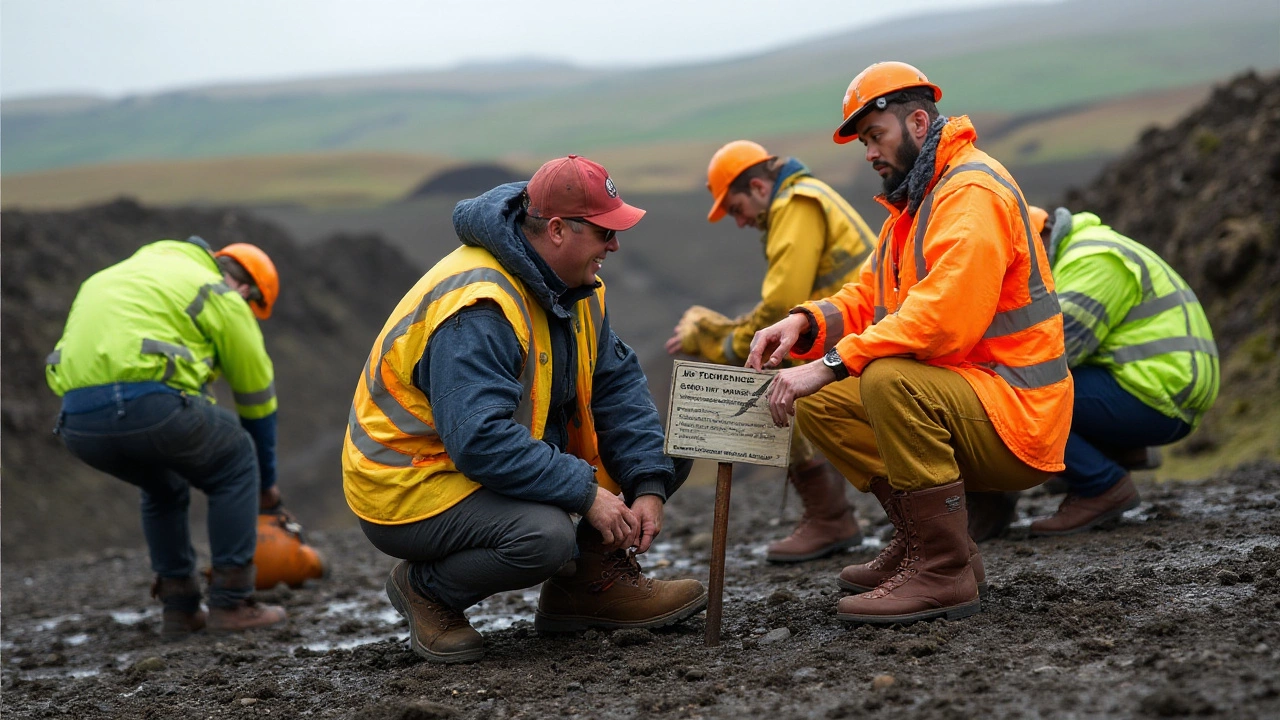In the lush, rolling landscapes of Ireland, where tradition meets modernity, many workers often wonder if their employer should pay for their work shoes. The question is far from simple, hinging on factors as diverse as the type of job, underlying safety needs, and longstanding workplace culture. If you’re navigating the Irish job market, knowing where your employer stands on this topic is quite essential.
In Ireland, the need for specialized work shoes can vary significantly from sector to sector. While an office job might not require anything beyond smart, polished footwear, those working in construction or in dynamic environments like Cork’s bustling culinary scene might need protective steel-toed boots or comfortable, non-slip shoes to ensure safety in the workplace. Such requirements aren't just practical, they are vital, and sometimes, they may dictate whether the employer foots the bill.
- Understanding Job Requirements in Ireland
- Legal Insights on Employer's Responsibilities
- Health and Safety Standards for Footwear
- Navigating Company Policies and Culture
- Practical Tips for Employees on Footwear
Understanding Job Requirements in Ireland
In Ireland, understanding job requirements is a multifaceted challenge, especially when it comes to selecting the right work shoes. The Emerald Isle, with its rich history of craftsmanship and modern industry, presents a diverse array of occupational standards that dictate footwear needs. From the fast-paced streets of Dublin to the rural expanses of County Kerry, each sector carries unique demands. Whether you’re pounding the pavements as a delivery driver in the historic lanes of Galway or working in one of Cork’s burgeoning tech startups, the type of footwear you sport could mean the difference between productivity and a health hazard.
Employment laws in Ireland are very particular when it comes to health and safety, covering everything from operational machinery to what’s on your feet. The Health and Safety Authority (HSA) plays a pivotal role, establishing guidelines ensuring that whether you are clad in steel-toed boots while scaling scaffolding or sporting slip-resistant shoes in bustling restaurant kitchens, you’re equipped to face the demands and dangers of your job. Notably, sectors such as construction, hospitality, and healthcare often have stringent mandates due to the nature of the tasks.
In a nation where tradition often converges with modern practices, it’s fascinating how much emphasis is placed on historical trades and their evolution. A classic example is Ireland’s brewing industry, where employees may be required to wear shoes that are not only practical for the moist, slippery environments but are often emblazoned with cultural pride in local craftsmanship. Even though this may seem a minor detail, it’s a significant contributor to both job satisfaction and identity.
Interestingly, a 2023 survey by the Irish Footwear Association revealed that 40% of Irish workers encounter specific footwear requirements tied to workplace safety protocols, a statistic indicative of an evolving market that values employee welfare and comfort as core to its operational success. This points towards a marked increase in employer-provided accessories, including specialized shoes, especially in industries with historically higher injury rates.
"Irish businesses are increasingly prioritizing employee safety, recognizing that proper footwear is not just about compliance, but also about ensuring productivity and well-being," commented Dr. Aoife Gallagher, a leading expert in occupational health.
The evolving nature of work and the globalization of the market have also introduced European and international standards into the Irish workplace, creating a unique blend of cultural and practical demands on the Irish worker. Hence, it's not unusual to see even the retail sector aligning more closely with international standards, ramping up their footwear guidelines to offer maximum protection and comfort.
In short, understanding job requirements in Ireland, especially something as seemingly simple as the choice of work shoes, is a complex interplay of safety, tradition, and modern industry practices. Whether you’re new to the Irish workforce or a seasoned professional, getting a grip on this essential aspect of job expectations is crucial not only for compliance but for personal safety and professional growth.
Legal Insights on Employer's Responsibilities
In Ireland, the landscape of workplace regulations and employee rights is as rich and varied as its culture. When it comes to whether an employer should cover the cost of work shoes, the answer is embedded in a tapestry of laws and conventional practices. The Safety, Health and Welfare at Work Act 2005 stands as the cornerstone of workplace safety legislation, which puts the onus on employers to ensure that their employees are operating in safe conditions. This may include providing appropriate personal protective equipment (PPE), which often encompasses footwear, particularly in fields where safety risks are prevalent.
Discussions around an employer's responsibility to fund workplace necessities often center on the potential hazards of the job. For example, in sectors like construction, roles require compliance with safety attire, including steel-toed boots. This aligns with the Health Service Executive's regulations mandating that employers provide PPE at no cost to employees when it is necessary for their safety. This leads to a reasonable argument that if a job requires specific footwear for safety reasons, the employer should bear that cost. However, it's not always cut and dry, and this is where company policies and cultural practices come into play.
It’s worth noting that there has been a growing emphasis on workplace wellbeing, highlighted by movements promoting better work-life balances and mental health considerations. This healthier work environment perspective is gradually influencing how costs related to employee welfare, such as proper uniforms or footwear, are managed. Yet, as much as the law provides a solid framework, interpretations can vary widely depending on the workplace, its culture, and even the economic climate. As one industry expert mentioned, "An employer should aim to create an environment where employees feel both valued and safe. Ensuring they have the appropriate attire is a vital first step."
The intricacies surrounding footwear policy don't just end with safety standards. Employers sometimes offer a stipend or reimbursement for purchasing footwear as part of a larger benefits package, which can vary drastically across industries and individual companies. While some Irish employers see this as a perk to attract quality employees, others might decide based on a stringent interpretation of their financial bottom line. This interplay between the necessary and the nice-to-have is where many workplaces find themselves debating the nuances of who covers the cost of work shoes.
In industries like hospitality or retail, where appearance and comfort are equally critical, the situation becomes more nuanced. Even if legal obligations don't explicitly require them to cover the cost, employers might choose to do so as part of fostering a positive workplace culture. Indeed, savvy companies classically recognize that proper footwear contributes not just to safety, but also to employee satisfaction and productivity. The Irish marketplace is particularly attuned to these trends, with sectors keen to stay competitive by adopting policies that support their workforce holistically.

Health and Safety Standards for Footwear
In Ireland, where lush landscapes and often unpredictable weather necessitate sturdy footwear, health and safety standards for work shoes take on a pivotal role. From construction sites to hospital corridors, the importance of proper footwear is woven into the fabric of various occupations. Employers and employees alike must pay close attention to these regulations, which can sometimes be as unpredictable as the famous Irish rain. At the heart of these standards is the directive that safety must never be compromised. Particularly in sectors like manufacturing, where heavy machinery is the norm, or hospitality, where fast-paced service is essential, the right shoes can prevent common workplace injuries such as slips, falls, and even toe-crushing incidents.
The Health and Safety Authority (HSA) in Ireland sets forth robust guidelines to manage these risks, urging workplaces to conduct thorough risk assessments that include an evaluation of footwear needs. A standout feature of these guidelines is the requirement for personal protective equipment (PPE), which encompasses work shoes designed to meet specific safety criteria. For employers, this means they must ensure their employees have access to the appropriate footwear, and sometimes, this translates financially into funding the cost. Nonetheless, it is crucial to understand that this is not a blanket rule—variations depend heavily on the nature of the job and the potential hazards involved.
For instance, a chef in Dublin's burgeoning foodie scene might require non-slip shoes due to the presence of slick kitchen floors, while a worker on a Kilkenny construction project might need reinforced boots to protect against heavy objects. Such specifications are not merely suggestions; they are actionable mandates that can significantly influence the outcome of workplace inspections. Failure to comply with regulations not only endangers employees but can also result in hefty fines for the employer, a risk few are willing to take given the stringent enforcement practices. To stay ahead, many Irish companies are increasingly integrating these requirements into their procedures, buying down the risks both legally and ethically.
Implementing Safety Footwear in the Workplace
Establishing clear policies around safety footwear can dramatically improve compliance with health and safety standards. Many companies in Ireland opt to include footwear allowances as part of their employment contracts, thus fostering a culture that values employee welfare. To facilitate this, they often partner with local shoe retailers like Clarks or Greenes Shoes, providing employees with vouchers or discounts for their shoe purchases. By doing so, they not only ensure compliance but also boost workforce morale—something Irish enterprises have valued since times immemorial.
"Safety needs to be a part of every company's DNA. Half of the job is preventing the problems, and the right footwear is an indispensable part of this," says Dr. Orla Healy, a respected safety consultant based in Galway.
In essence, addressing health and safety standards for footwear is a nuanced task that requires ongoing attention and adaptability. Employers should engage in regular reviews to assess the relevancy and efficacy of their safety footwear policies, making updates where necessary. Employees, for their part, are encouraged to communicate any emerging needs or issues regarding their work shoes, ensuring that safety remains a top priority in every workplace across Ireland.
Navigating Company Policies and Culture
When considering whether your employer in Ireland should pay for your work shoes, it’s important to understand how company policies and workplace culture influence this decision. In many Irish firms, policies regarding employee attire are deeply embedded within the broader corporate culture and may vary greatly from one organization to another. Some companies have explicit guidelines on employee uniform, including work shoes, and may provide a stipend or reimbursement for footwear deemed necessary for the position. In other cases, particularly in family-owned or traditional businesses with strong cultural underpinnings, such negotiations might be conducted informally or determined by long-standing practices.
Understanding your company's specific policies requires navigating through employee handbooks, agreements, or simply initiating a conversation with your HR department. It is crucial to be aware of any established guidelines related to reimbursements, as not all companies automatically offer this benefit. Many Irish organizations place a strong emphasis on employee safety and comfort, especially in industries like hospitality or construction. An insightful approach would be to examine the policies of companies renowned for their excellent employee welfare, such as those found in the tech hubs around Dublin or Cork’s ever-growing food and beverage sector. A survey might reveal whether competitors are contributing to employee footwear expenses, consequently putting pressure on others to adopt similar measures.
The culture within the company also plays a critical role. In Irish workplaces, where communication and camaraderie are often cherished, approaches to policy may be more flexible, allowing employees to discuss specific needs with their managers. The type of environment—whether corporate or casual—could determine the strictness of adherence to formal policy versus a more tailored approach. An interesting anecdote comes from an interview with a manager at an Irish software company, who remarked,
“We like to keep things straightforward. If shoes are necessary for your job, especially for site visits, we usually just expense them to save any hassle.”Such anecdotes showcase the varying degrees of adaptability in different workplace settings.
Finally, in cases where a policy is unclear or non-existent, employees could propose the introduction of a reimbursement scheme, particularly if a substantial portion of their colleagues face similar needs. Presenting this as a matter of collective employee welfare can often yield a positive response, illustrating another hallmark of Ireland’s workplace culture—a shared sense of community and mutual support. By understanding and approaching these nuances with both information and diplomacy, you can effectively navigate policies and advocate for a solution that benefits both you and your employer. After all, aligning workplace policies with modern employee needs can create a more productive and satisfied workforce across Ireland.

Practical Tips for Employees on Footwear
Deciding what to wear on your feet for work in Ireland is not as straightforward as one might imagine. The Irish workplace is diverse, with environments ranging from the tech hubs of Dublin to the vibrant agricultural fields of Mayo. While the requirement for robust work shoes varies, being knowledgeable can make a significant difference. Firstly, employees should consider the specific demands of their job. Are you often on your feet, or do you work in a safety-conscious environment? These details will steer you toward specific types of footwear, such as cushioned trainers or safety boots. It's also advisable to explore what other employees in similar roles are wearing, as this might provide insight into what might not only be practical but comfortable.
Another tip revolves around understanding your company's policy on footwear. Although it might feel daunting, asking your manager about the financial aspect of purchasing work footwear might reveal unexpected information, like schemes your employer already has in place. If buying your shoes seems unavoidable, it can help to look for local sales or worker-specific discounts. Many retailers offer products specifically tailored to the Irish market, balancing durability with the unique Irish climate needs, where rainy days are as common as a morning cup of tea. It also makes financial sense to invest in quality since well-made shoes last longer and often need fewer repairs.
Pay attention to the seasonal shifts that characterize Ireland's weather. For instance, waterproof features can be a godsend during the rainy months, which are a predictable guest throughout the year. Recent surveys indicate that employees who invest in more suitable gear tend to report higher satisfaction and productivity levels. Don't forget the aesthetics, though—it might still align with your employer's dress code and maintain a professional appearance. Remember that your footwear is an extension of your work attire. By balancing functionality, company policy on dress code, and style, you align with both personal comfort and professional image.
Never underestimate the power of a good pair of insoles. They can drastically change your experience, providing much-needed support for those extra-long shifts or those days when you're running around the office or workshop. If in doubt, consider a second opinion from a podiatrist, especially if your job is physically demanding. Investing in quality work shoes, whether funded by you or your employer, is an investment in your health. Above all, know your rights and workplace ENVIRONMENT. An informed employee is an empowered employee. As health and safety standards are continually evolving, particularly in highly regulated industries, keeping oneself updated on best practices is equally important.
